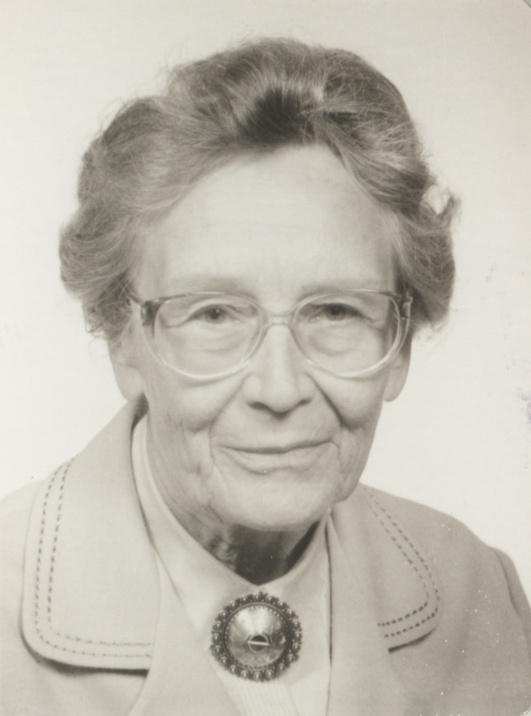
Salme Raatma
Salme Raatma (until 1935 Salme Rosenberg, given name Salme Rosenstein, 25. VI 1915 – 28. II 2008) was a children’s author and poet.
Salme Raatma was born the daughter of a farmer at Aindujaagu farm at Liinaküla village, Helme parish, in Viljandimaa county. She was schooled at Helme and Tõrva, and from 1933 to 1938 studied art history, literature and ethnography at the University of Tartu. During her studies she worked as a cataloguer at the National Museum of Estonia. Her proseminar and seminar works from that period have been preserved: ‘The Estonian bagpipes’ (1937) and ‘Scythe-sharpening methods in Estonia’ (1938). During her school years the future poet had several opportunities to be present at Henrik Visnapuu’s readings at Helme and Tõrva. In the museum’s cataloguing room she was able to talk with August Sang, a member of the Arbujad poetry group, who was working there.
Marriage to Pastor Herbert Alexander Rosenstein in 1938 sent the young couple to Noarootsi on the other side of Estonia. The young family had hardly had time to settle in their new residence when, as a result of the Molotov-Ribbentrop Pact, naval bases of the USSR were established in Estonia and Hitler called the Baltic Germans living in the Baltic countries to come and live in Germany, whither the Rosensteins also moved.
Salme Raatma’s first fairy-tale appeared in print under Marie Under’s editorship in 1943 in Tallinn. From then on Raatma developed into an author of children’s stories, tales of Christian piety and fairy-tales in both the German and the Estonian cultural space. Her works are characterised by a clear and simple diction taken from life.
Raatma managed to create a link to Estonian writers in exile. Writing in isolation in Germany, she succeeded in making contact with the journal Tulimuld and Bernard Kangro in Sweden. In 1963 Salme Raatma translated Ellen Niit’s children’s book Pille-Riini lood (‘The Pille-Riin Stories’) into German.
In 1964 Raatma’s husband successfully won the competition for the directorship of the German congregation and the seamen’s mission at Turku Castle, and the family moved to Finland. In Finland Raatma started writing more poetry, reviews and short essays. Some of them appeared under the name Ants Hartmann.
After the restoration of the Republic of Estonia in 1991, Raatma often visited Estonia.
Salme Raatma also wrote the long poems Ülekandja Christophorus (‘Christophorus the Carrier’), Munk või erak (‘Monk or Hermit’), Hiiuallik (‘The Source of Giants’), and Pirita peegeldused (‘Reflections of Birgitta’), the last of these about the life of St. Bridget.
L. P. (Translated by C. M.)
Books in Estonian
Prose
Mis seal näha oli?. Lund: Eesti Kirjanike Kooperatiiv, 1964, 307 lk.
Prillidega ingel: mõttepilte. Turu, S. Raatma, 1998, 64 lk.
Children’s stories
Minu karu: lastejutte. Lund: Eesti Kirjanike Kooperatiiv, 1956, 64 lk.
Mis sinust tuleb? Valimik lastejutte. Uppsala: Eesti Vaimulik Raamat, 1963. 84 lk.
Jänesepoeg, kes lendas kuu peale. Stockholm: Rootsi-Eesti Õpperaamatufond, 1978. 31 lk.
Sinised õunad ja teisi jutte lastele. Toronto: Toronto Eesti Seltsi Täienduskoolide Komitee, 1984. 37 lk.
Lumekuninganna ja teisi jutte lastele. Toronto: Toronto Eesti Seltsi Täienduskoolide Komitee, 1986. 48 lk.
Oleks mul sõber: lastejutte. Tallinn: Logos, 2002. 74 lk.
Poetry
Päev ootab sind: valik luuletusi aastaist 1954–1976. Turku: Muuriankkuri, 1982. 68 lk.
Valge lagi: luuletusi aastaist 1964–1984. Turu: Turun Yliopiston Offsetpaino, 1985. 71 lk.
Laululatern: luuletusi, 1980–1993. Turu: Turun yliopisto, 1993. 62 lk.
Tuhat soovi: neljas kogu luuletusi. Turu: Painosalama, 1995. 68 lk.
Pirita peegeldused: poeem. Turu: S. Raatma, 1997. 73 lk.
Õnnelikud kanad õnnemaal: Vana Salme uued värsid. Turu: 1998. 24 lk.
Muld ja tuuled: valitud luuletused. Tallinn: S. Raatma, 2000. 158 lk.
Memoirs
Kultuurikilde endisest Eestist ning väliseesti ajast. Turu: S. Raatma-Rosenstein, 2002. 90 lk.



